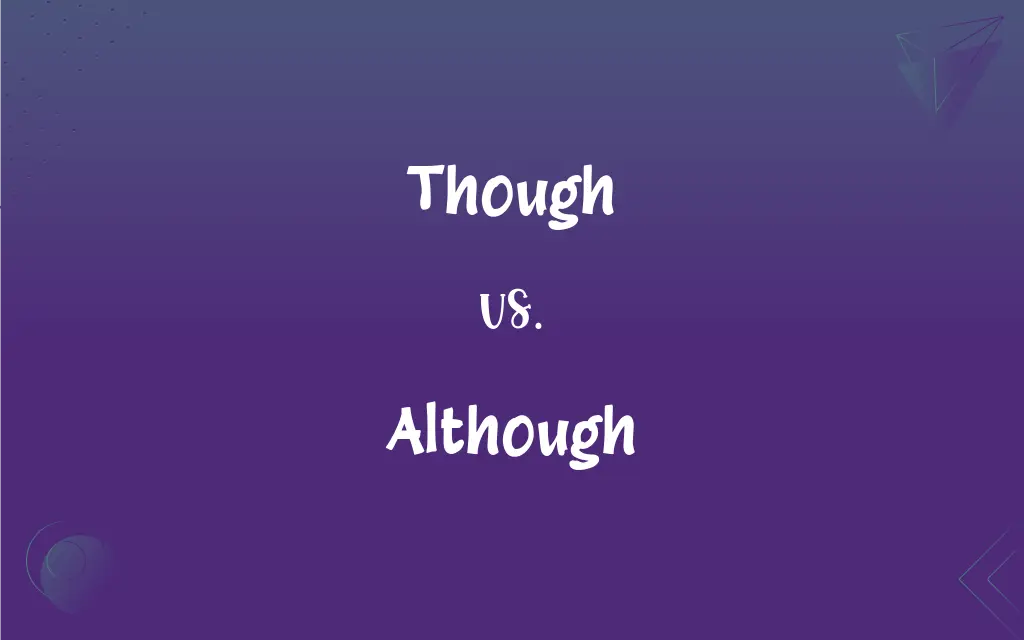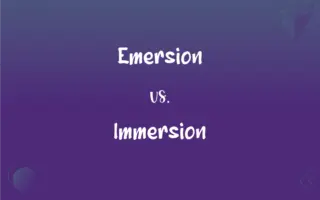Though vs. Although: What's the Difference?
Edited by Harlon Moss || By Janet White || Published on November 6, 2023
"Though" and "Although" are both conjunctions used to introduce contrasting information, with "Although" being slightly more formal than "Though."

Key Differences
"Though" and "Although" are often interchangeable, serving to introduce a subordinate clause that presents contrasting or unexpected information. For instance, "Though he was tired, he continued working" and "Although he was tired, he continued working" mean the same.
The key difference between "Though" and "Although" is their degree of formality and flexibility in sentence placement. "Although" is somewhat more formal and is typically used at the beginning of a contrasting clause. Conversely, "Though" can be more flexible, appearing at the beginning, middle, or end of a sentence.
Another nuance between "Though" and "Although" is their usage in informal contexts. In casual speech or writing, "Though" can sometimes function almost like an adverb, placed at the end of a sentence. For instance, "I didn't mind the rain, though."
Both "Though" and "Although" can be replaced by "Even though," which emphasizes the contrast more strongly. For instance, "Even though he was tired, he continued working" places greater emphasis on the unexpected nature of the action given the preceding condition.
Comparison Chart
Formality
Less formal
More formal
ADVERTISEMENT
Typical Placement
Beginning, middle, or end of a sentence
Usually at the beginning of a contrasting clause
Interchangeability
Often used as "Although"
Can be replaced by "Though"
Use as an Adverb
Can sometimes function as an adverb
Does not function as an adverb
Emphasis
Standard contrast
Standard contrast
Though and Although Definitions
Though
Used to soften a statement.
I'll go, though I don't really want to.
ADVERTISEMENT
Although
Used to convey a contrast.
Although small, the room is cozy.
Though
Nevertheless or in spite of that.
He lost the game, though he played well.
Although
Even if; even though.
Although he tried, he couldn't succeed.
Though
A conjunction introducing contrast.
He's loud, though he means well.
Although
However; but.
He's coming, although I don't know when.
Though
However; yet.
It's simple, though not easy.
Although
Introducing a contradictory statement.
Although it's sunny, it's quite cold.
Though
Despite the fact that.
Though it rained, we went out.
Although
Despite the fact.
She went out, although it was raining.
Though
Despite the fact that; although
He still argues, though he knows he's wrong. Even though it was raining, she walked to work.
Although
Regardless of the fact that; even though
Although the room is big, it won't hold all that furniture.
Though
Conceding or supposing that; even if
Though they may not succeed, they will still try. See Usage Note at although.
Although
But; however
He says he has a dog, although I've never seen it.
Though
However; nevertheless
Snow is not predicted.
We can expect some rain, though.
Although
Though, even though, in spite of or despite the fact that: introducing a clause that expresses a concession.
Although it was very muddy, the football game went on.
The patients, (al)though getting stronger, will not come off their medications.
Though
(Informal) Used as an intensive
Wouldn't that beat all, though?.
Although
But, except.
It was difficult, although not as difficult as we had expected.
Though
(conjunctive) Despite that; however.
I'm not paid to do all this paperwork for you. I will do it this once, though.
Although
Grant all this; be it that; supposing that; notwithstanding; though.
Although all shall be offended, yet will not I.
Though
(degree) Used to intensify statements or questions; indeed.
"Man, it's hot in here." — "Isn't it, though?"
Although
Despite the fact that;
Even though she knew the answer, she did not respond
Though
Despite the fact that; although.
Though it is risky, it is worth taking the chance.
Though
(archaic) If, that, even if.
We shall be not sorry though the man die tonight.
Though
Granting, admitting, or supposing that; notwithstanding that; if.
Though he slay me, yet will I trust in him.
Not that I so affirm, though so it seem.
In the vine were three branches; and it was as though it budded.
Though
However; nevertheless; notwithstanding; - used in familiar language, and in the middle or at the end of a sentence.
I would not be as sick though for his place.
A good cause would do well, though.
Though
Despite the fact that;
Even though she knew the answer, she did not respond
Though
(postpositive) however;
It might be unpleasant, though
FAQs
Is "Although" used in informal speech?
Yes, but "Though" is more common in casual contexts.
Can both words be replaced by "Even though"?
Yes, "Even though" provides stronger emphasis on contrast.
Can I start a sentence with "Though"?
Yes, e.g., "Though I understand, I still disagree."
Are there situations where only one of the two should be used?
In formal writing, "Although" is often preferred; conversely, at the end of sentences in informal contexts, only "Though" is used.
Are "Though" and "Although" interchangeable?
Often yes, but "Although" is typically more formal.
Can "Though" be used at the end of a sentence?
Yes, especially in informal contexts, e.g., "I liked it, though."
Is "Though" always a conjunction?
Mostly, but in casual contexts, it can function almost like an adverb.
Can "Although" end a sentence like "Though"?
Typically no. "Though" is more flexible in this regard.
Which is more formal: "Though" or "Although"?
"Although" is generally more formal.
Is "Although" used to introduce unexpected outcomes?
Yes, similar to "Though," it introduces contrasting information.
About Author
Written by
Janet WhiteJanet White has been an esteemed writer and blogger for Difference Wiki. Holding a Master's degree in Science and Medical Journalism from the prestigious Boston University, she has consistently demonstrated her expertise and passion for her field. When she's not immersed in her work, Janet relishes her time exercising, delving into a good book, and cherishing moments with friends and family.
Edited by
Harlon MossHarlon is a seasoned quality moderator and accomplished content writer for Difference Wiki. An alumnus of the prestigious University of California, he earned his degree in Computer Science. Leveraging his academic background, Harlon brings a meticulous and informed perspective to his work, ensuring content accuracy and excellence.






































































